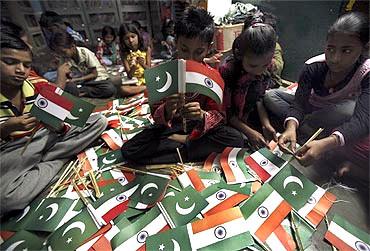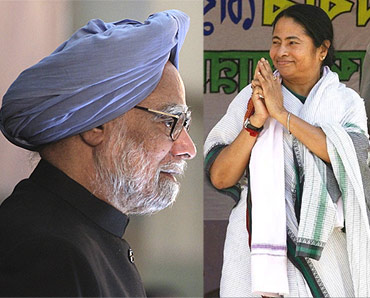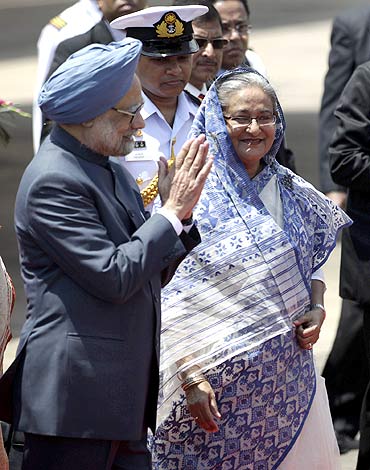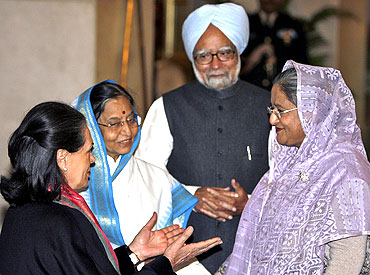
Mamata Banerjee is entitled to defend her people's interest but to boycott talks will trouble India's eastern neighbour for a long time, says B Z Khasru
During the Indo-Pak talks in New Delhi on April 8, 1974, the Pakistani delegation leader suggested to the Indians inclusion of a phrase -- "on the basis of sovereign equality" -- in the agreement they were about to sign, which reiterated the two nations' resolve to work toward achieving durable peace in the subcontinent.
In marking the proposal, Aziz Ahmed, then Pakistan's state minister for foreign affairs, pointed out that sovereign equality was the phrase India used repeatedly when it raised the subject of possible discussions between Pakistan and newly-independent Bangladesh.
To Pakistan's surprise, Kewal Singh, then India's foreign secretary, brushed off the idea, saying he was "sick" of hearing this phrase. Swaran Singh, then India's external affairs minister, dismissed it as mere platitude.
Pakistan, which negotiated from a point of weakness just after suffering a crushing defeat in the Bangladesh Liberation War, dropped the subject, not wanting to hinder the adoption of the pact over this one point.

India's reluctance to include the phrase suggested to the Pakistanis that their giant neighbour considered itself more than equal to Pakistan. This episode continued to trouble Pakistan for quite some time.
West Bengal Chief Minister Mamata Banarjee's decision to boycott Prime Minister Manmohan Singh's just-concluded visit to Bangladesh over the Teesta River water sharing might also continue to trouble her neighbour for a long time. Bangladesh might reflect back on this even more acutely, given the Bengalis on both sides of the border share a common heritage.
Mamata's decision would adversely affect the Bengali mind not just because she wanted more water for her state. Of course, as the chief executive of the state she must protect her people's interest. What will bother Bangladesh is that she found it prudent to stay away, instead of engaging in talks to resolve the matter to both sides' satisfaction.

Her decision not only holds the potential to cause wrinkles in Indo-Bangla relations, it has also dealt a blow to the central government's image, causing a negative perception about its authority to conduct foreign policy in the interest of the entire country -- and the region as a whole.
India is not merely a country in South Asia, but also a regional superpower and a potential global player. A veto power by a state over its foreign policy is certainly a matter into which the external affairs ministry needs to look closely.
Mamata's pulling out of the prime minister's entourage embarrassed Dr Singh. Her dramatic protest dealt a severe blow also to Prime Minister Sheikh Hasina, who had expected India to reciprocate her bold steps in addressing New Delhi's security concerns and its long-time request for transit through Bangladesh.
The Teesta fiasco also killed two other key potential deals: Sharing of the Feni river water and letting India use Chittagong and Mongla seaports to carry goods through Bangladesh.

To India's credit, it has tried to reassure its neighbours by being correct and even generous in its official dealings with them. But its specific security considerations, its self-image as the dominant power in South Asia, domestic political pressures and bureaucratic differences within the government continued to create tensions between India and its smaller neighbours.
The largest and most important of these smaller neighbours -- Bangladesh -- went through ups and downs in its relations with Delhi, thanks to some imprudent steps by India and political upheavals in Bangladesh. As a result, problems left over from the period of confrontation under Pakistan were not proving amenable to a quick solution.
Since 1971 India has sought to reassure its smaller neighbours, Bangladesh included. Indian officials have been visiting, discussing, explaining and giving assistance. Discussions with Bangladesh have been almost continuous.
Dr Singh prudently reinforced India's policy in Dhaka when he declared: "India will not, I repeat and assure you, India will not take steps that will adversely affect Bangladesh." It will be sweet music not just for the Bengali ear, but for others as well -- far away. It will reassure not only Bangladesh, but also others beyond the Himalayas.

India's main interest in its smaller neighbours is its security against China. This is particularly true in the case of Nepal, Bangladesh and Bhutan, any of which would provide China with strategic access to the southern side of the Himalayas.
The linkages between India and her smaller neighbours have created groups within India with a special interest in Indian relations with these countries. Despite occasional clashes of interests, some West Bengalis and other Indian businessmen have both real and sentimental interests in forging a beneficial relationship between Kolkata and Dhaka.
Regional differences and bureaucratic inefficiencies play a big role in India's behaviour to its neighbours. The correct posture represents the position of the external affairs ministry. On important issues, it can usually impose its view on other ministries. But parochial interests come into play and tend to undermine the good intentions of the foreign office. Regional politicians may be well advised to remember they are not just Bengalis or Punjabis, they are also Indians.